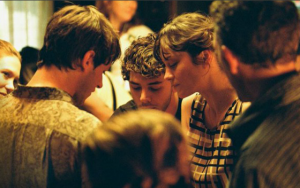Canada AM: The 69th annual Cannes Film Festival kicks off in Paris
 Richard talks about the big films at Cannes this year with “Canada AM” host Beverly Thomson.
Richard talks about the big films at Cannes this year with “Canada AM” host Beverly Thomson.
Watch the whole thing HERE!
 Richard talks about the big films at Cannes this year with “Canada AM” host Beverly Thomson.
Richard talks about the big films at Cannes this year with “Canada AM” host Beverly Thomson.
Watch the whole thing HERE!
 Richard talks Cannes and Xavier Dolan with the Canadian Press.
Richard talks Cannes and Xavier Dolan with the Canadian Press.
“I think he’s got probably a pretty good shot certainly at being taken seriously as a contender, even thought he’s up against the who’s who of international filmmakers like Ken Loach, Pedro Almodovar, Paul Verhoeven, Sean Penn,” says Toronto-based film reviewer Richard Crouse.
“There are a lot of people here that are working at a very high level, but I’d suggest that Xavier Dolan is working at just as high a level.”
Read the whole thing HERE!
 Javier Bardem dedicated his No Country for Old Men Oscar to a frequent co-star. “Mom this is for you,” the emotional actor said. “This is for your grandparents, for your parents, Rafael and Matilde, this is for the actors of Spain, who have brought, like you, dignity and pride to our job.”
Javier Bardem dedicated his No Country for Old Men Oscar to a frequent co-star. “Mom this is for you,” the emotional actor said. “This is for your grandparents, for your parents, Rafael and Matilde, this is for the actors of Spain, who have brought, like you, dignity and pride to our job.”
You see, Bardem, the first Spaniard to win an acting Academy Award, comes from a long line of actors. His performing arts lineage stretches back nearly a hundred years but it wasn’t always a given that he would join the family business.
His first acting gig came at age six and even though he continued to work on TV and in films he studied to be a painter. He put down the brush, however, when he realized he’d never be a great artist and tried his hand at writing, construction and even stripping (but only for one night).
His road to Hollywood began at age twenty with an offer to appear alongside his mother Pilar Bardem in the movie Las edades de Lulú. She advised him to take the role seriously and take acting classes. He did, and never looked back.
The young Bardem appeared on TV, worked with Pedro Almodovar, certainly a rite of passage for all future Spanish superstars, and found fame with Jamon, Jamon, a film co-starring his future wife, Penelope Cruz.
If not for the persistence of John Malkovich however, English language audiences may never have discovered the Spanish star. In 1997 Malkovich was planning his directorial debut, The Dancer Upstairs. He offered the lead to Bardem who turned it down because he didn’t feel confident acting in English. Continuing to work in Spain, Bardem made two dozen films, collected awards like Best Actor at the Venice Film Festival for The Sea Inside and become the first Spanish actor to be nominated for a Best Actor Oscar for Before Night Falls.
The part made him an international superstar—Al Pacino even left a message on his answering machine praising the performance and Francis Ford Coppola compared him to Robert de Niro.
Meanwhile Malkovich finally had the money to make The Dancer Upstairs, and by this time, 2002, Bardem had becoming fluent in English—he says he sang along with AC/DC to learn the language—and felt confident enough to take on a major English speaking role.
Of course, Hollywood came calling—he turned down the Witwer role in Minority Report which eventually went to Colin Farrell—and he finally made his Hollywood debut in a cameo appearance as a crime lord who hires Tom Cruise to dispatch some troublesome witnesses in the thriller Collateral.
He made his strongest impression as No Country for Old Men’s sociopathic assassin, Anton Chigurh. Entertainment Weekly called him one of the “50 Most Vile Villains in Movie History.”
Then he switched gears, playing a comedic role in Woody Allen’s Vicky Christina Barcelona, a part which made him a Hollywood romantic lead, on screen and off. Reunited with his old Jamon Jamon co-star Penelope Cruz in Allen’s film they quietly started dating in 2007. The couple kept a low profile—when asked about their relationship in 2009 all Cruz would say is, “He’s a friend and the best actor in the world.”—but married in 2010 in front of family members during an intimate ceremony at a friend’s Bahamian home. In January 2011 the actress gave birth to their son, Leo.
Professionally Bardem also kept busy. In 2010 he proved he could do it all. In the same calendar year he released two movies back to back, Eat Pray Love, a big budget romance and Biutiful, a gritty Spanish language drama that cemented his rep as the movie’s most versatile leading man.
Speaking with him the night before Biutiful made its debut at the Toronto International Film Festival I asked if his preparation process varies from role to role.
“I think it is the same process but of course there is more weight in this,” he said. “There is more emotional weight than in Eat Pray Love because the character has to carry a lot of things with him but I think at the end it is about trying to understand who the person is, being honest and trying to put that on the screen.”
Biutiful’s story of a low-level criminal in Barcelona trying to put his life together in light of unbearable guilt over a tragic accident and a death sentence from his doctor grabbed Bardem right away.
“Most of the scripts [I get] are very boring,” he told me. “They are the worst reading material you can have. When you are in to too many scripts you don’t read a good book for a long time and you realize you need to get a good book and lose yourself in those words. In this case [the script] had an emotional impact on me.”
Biutiful offered up one of the biggest challenges of his career. “To take a man that you are not actually liking from the first moment [and make an audience] understand that behind that is a man who really needs compassion, who really needs to love. That is the challenge.”
Biutiful which airs on TMN this month, earned Bardem his third Oscar nomination. He calls the movie a “a gift” and acknowledged to me that his performance wouldn’t have been possible without the help of his director Alejandro González Iñárritu.
“I think he is one of the greatest actor’s directors,” he said, adding that Iñárritu provided a detailed, written character sketch before shooting began.
“When he handed that great work to me I was pleased because I am lazy. It helps you to more or less have the image. We work with imagination so we have to understand who [the character is]. Even if the others don’t get it you need to know where you are when he says action, otherwise you are up in the air.”
 Proof that Pedro Almodóvar’s reputation as provocateur is secure came after a recent screening of “The Skin I Live In,” his new film starring Antonio Banderas as an obsessed plastic surgeon. As I was filing out another critic came to me and said, “Wow, that was weird, even for an Almodóvar film.” It’s a skin flick (literally) about Oedipal revenge, sex and plastic surgery.
Proof that Pedro Almodóvar’s reputation as provocateur is secure came after a recent screening of “The Skin I Live In,” his new film starring Antonio Banderas as an obsessed plastic surgeon. As I was filing out another critic came to me and said, “Wow, that was weird, even for an Almodóvar film.” It’s a skin flick (literally) about Oedipal revenge, sex and plastic surgery.
Based on Thierry Jonquet’s novel “Mygale,” Banderas plays Robert Ledgard a brilliant plastic surgeon with a troubled life. His luxurious mansion house not only an operating room, and recovery facility, but a dark secret. Hidden from the world is Vera (Elena Anaya), a patient—or is she a prisoner?—who acts as a guinea pig for the doctor’s experiments. He’s trying to perfect a new kind of skin resistant to burns and bites. There’d be no more malaria, no more burn victims. Trouble is, his experiments are completely illegal.
There’s more. Lots more, but part of the please of “The Skin I Live In” is allowing Almodóvar to reveal the story at his own pace. It’s part “Frankenstein (with better skin) or Plastic Surgeons Gone Wild, but all Almodóvar. It’s audacious, diabolical, unexpected and possibly the kind of film Hitchcock might have made, but only in his wildest imagination.
Banderas, in his first pairing with the director in twenty years, is a revelation. His US work, while often successful, is dwarfed by his performance here. Working with Almodóvar and in his native tongue brings out nuances often missing from his English films. It’s an understated but powerful performance that conveys the doctor’s evil compulsions without ever dipping into the Central Casting mad scientist box of personality tics.
He leads the strong cast, including the impossibly beautiful Elena Anaya as Vera and Marisa Paredes as Marilia, the exposition giving housekeeper.
This may not be Almodóvar’s strongest film—it lacks some of the self aware humor of his early efforts and requires massive leaps of faith from the audience—but the man is a master. What it lacks in strong story telling it makes up for in his strong sense of style and audaciousness.
 Penelope Cruz’s lackluster performances in Hollywood movies like Gothika and Vanilla Sky left North American audiences questioning her star power. Well, question no more. Her powerhouse performance in Volver as Raimunda, a resourceful working class mother who must deal with a precocious daughter, a lazy husband and an eccentric sister, is earning her the best notices of her career. Working in her native Spanish and paired for a second time with superstar director Pedro Almodóvar, Cruz unveils a tangled web of a story that mixes humor with murder, abuse and hope—think Mildred Pierce with a hint of Arsenic and Old Lace— as three generations of women deal with the hands that life has dealt them.
Penelope Cruz’s lackluster performances in Hollywood movies like Gothika and Vanilla Sky left North American audiences questioning her star power. Well, question no more. Her powerhouse performance in Volver as Raimunda, a resourceful working class mother who must deal with a precocious daughter, a lazy husband and an eccentric sister, is earning her the best notices of her career. Working in her native Spanish and paired for a second time with superstar director Pedro Almodóvar, Cruz unveils a tangled web of a story that mixes humor with murder, abuse and hope—think Mildred Pierce with a hint of Arsenic and Old Lace— as three generations of women deal with the hands that life has dealt them.